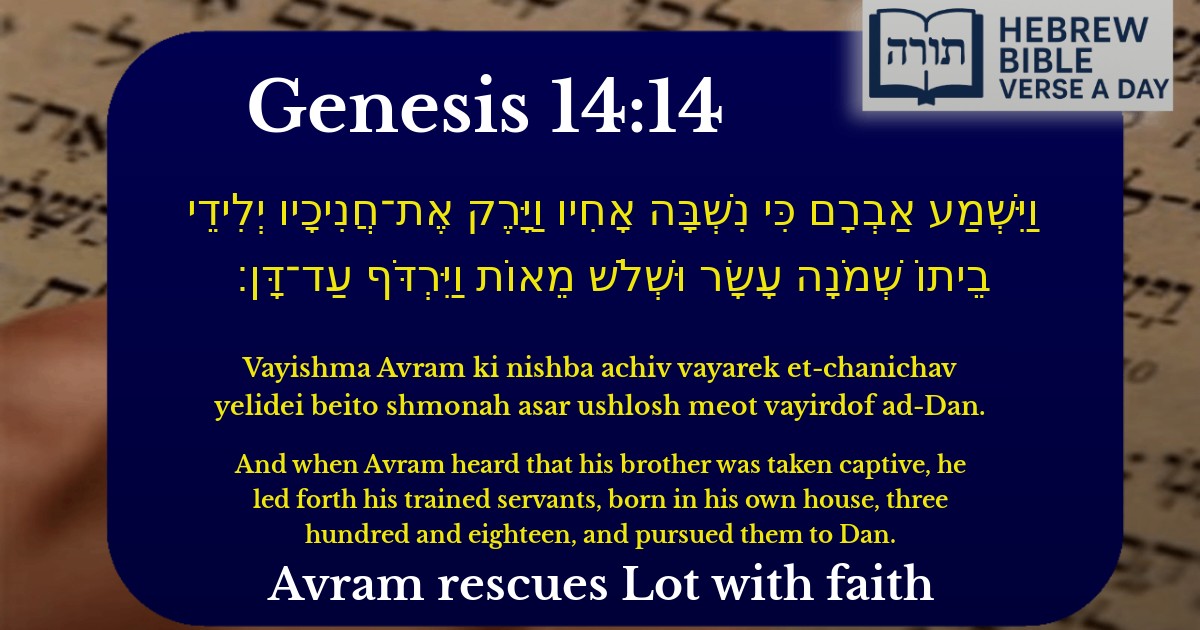Join Our Newsletter To Be Informed When New Videos Are Posted
Join the thousands of fellow Studends who rely on our videos to learn how to read the bible in Hebrew for free!
Hebrew Text
וַיִּשְׁמַע אַבְרָם כִּי נִשְׁבָּה אָחִיו וַיָּרֶק אֶת־חֲנִיכָיו יְלִידֵי בֵיתוֹ שְׁמֹנָה עָשָׂר וּשְׁלֹשׁ מֵאוֹת וַיִּרְדֹּף עַד־דָּן׃
English Translation
And when Avram heard that his brother was taken captive, he led forth his trained servants, born in his own house, three hundred and eighteen, and pursued them to Dan.
Transliteration
Vayishma Avram ki nishba achiv vayarek et-chanichav yelidei beito shmonah asar ushlosh meot vayirdof ad-Dan.
Hebrew Leining Text
וַיִּשְׁמַ֣ע אַבְרָ֔ם כִּ֥י נִשְׁבָּ֖ה אָחִ֑יו וַיָּ֨רֶק אֶת־חֲנִיכָ֜יו יְלִידֵ֣י בֵית֗וֹ שְׁמֹנָ֤ה עָשָׂר֙ וּשְׁלֹ֣שׁ מֵא֔וֹת וַיִּרְדֹּ֖ף עַד־דָּֽן׃
וַיִּשְׁמַ֣ע אַבְרָ֔ם כִּ֥י נִשְׁבָּ֖ה אָחִ֑יו וַיָּ֨רֶק אֶת־חֲנִיכָ֜יו יְלִידֵ֣י בֵית֗וֹ שְׁמֹנָ֤ה עָשָׂר֙ וּשְׁלֹ֣שׁ מֵא֔וֹת וַיִּרְדֹּ֖ף עַד־דָּֽן׃
🎵 Listen to leining
Parasha Commentary
📚 Talmud Citations
This verse is quoted in the Talmud.
📖 Nedarim 32a
The verse is discussed in the context of Abraham's righteousness and his actions to rescue Lot, highlighting the significance of his 318 trained servants.


Avraham's Response to Lot's Capture
The verse (Bereishit 14:14) describes Avraham's immediate action upon hearing that his nephew Lot was taken captive. Rashi explains that Avraham's swift response demonstrates his exceptional middat chesed (attribute of kindness), as he risked his life to save Lot despite their prior separation (Bereishit 13:11). The term "וַיָּרֶק" ("led forth") is interpreted by the Midrash (Bereishit Rabbah 43:2) to mean Avraham armed his disciples with Torah knowledge, as the word shares a root with yerikah (spittle), symbolizing the "sharpness" of their wisdom.
The Significance of 318 Servants
The number 318 (שְׁמֹנָה עָשָׂר וּשְׁלֹשׁ מֵאוֹת) is addressed by multiple commentators:
Pursuit "Until Dan"
The location "Dan" is noted by Rashi as prophetic: this would later become a site of idolatry when Yeravam set up golden calves (Melachim I 12:29). The Midrash (Tanchuma Vayera 8) states Avraham's victory there foreshadowed future struggles with the yetzer hara (evil inclination) associated with the place.
Military Action and Spiritual Lessons
The Rambam (Hilchot Melachim 5:1) derives from this episode that war to rescue Jews from captivity is a milchemet mitzvah (obligatory war). The Kli Yakar emphasizes that Avraham's victory with a small force (per Rashi's view) demonstrated bitachon (trust in Hashem), a model for future generations.